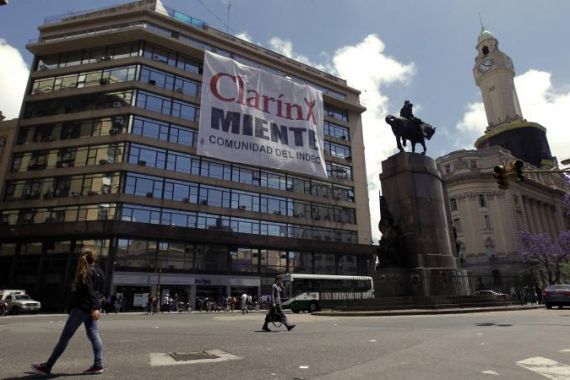Argentinian government takes on media giant
Government accuses Clarin group of dominating media, while company says administration is trying to suppress free press.

It is one of the most controversial power struggles in Argentina in the last few years. During the government of Nestor Kirchner, the enemy was the oligarchy and the farmers. For Cristina Kirchner, his wife and successor, the enemy is the Clarin Group: the largest and most powerful media group in Argentina.
Clarin began publishing its daily newspaper in the 1940s – it is now among the most widely read in Latin America. But it faces an uncertain future.
Clarin-owned outlets and publications are generally critical of President Cristina Kirchner, who has never disguised her dislike for the company and its power to shape public opinion.
Three years ago, she pushed for a new law limiting the size of media conglomerates. Its backers say it will allow state- and non-profit media to stay competitive, but many saw it as a direct attack on Clarin.
“The government thought of a law to destroy us, because we are the only ones who are challenging them,” Martin Etchevers, a spokesperson for Clarin, told Al Jazeera.
“For the government, there are friends or enemies and they do not accept the roles of independent press.”
The government has accused Ernestina Herrera de Noble, Clarin’s owner, of adopting two children who were born to disappeared mothers during the dictatorship. It is an accusation that remains unproven. They have also accused the company of being part of a mafia.
Clarin’s influence goes beyond just being a newspaper. It owns radio and TV cable operations across the country. The new law forces the company to massively downsize its media empire. And if they do not do it willingly, the government says it will do it for them.
On Sunday, a judge extended the deadline for Clarin to comply with the law while a court considers whether two articles of it are constitutional.
Clarin says that it was Nestor Kirchner’s government who helped them expand their business in 2007, and that now five years later they are trying to take cable television away from them.
“We invested money during all these years and now the government wants to take it away? They are the ones who gave it to us,” said Etchevers, who claims the government is trying to censor free speech.
The government says the case comes down to fair business practices, not free speech.
“Clarin wants to profile us as if we are threatening public speech and its just the opposite,” insists Martin Sabatella, of the Federal Audiovisual Communication Services Authority.
“Clarin is trying to protect its concentrated economic interests and needs to find a cause to defend itself.
“They are challenging democracy because the law was passed by both chambers.”
He said the government will go to the Supreme Court to define whether the articles that Clarin is debating are constitutional or not.
The law is already in effect, but only two articles have been suspended. Those articles affect Clarin’s economic interests.
When it was voted on in 2009, the law was widely praised by civil society as the first attempt at reforming the media landscape since the country’s decades of military dictatorship – a period where many say Clarin grew into the dominant force it is today.
“There is a new media law because the Kirchners wanted to destroy Clarin, but the law also has many benefits and was needed because [the previous law] allowed the concentration of power,” says journalist Marcela Mochkofsky.
In history there are many measures that have been taken for all the wrong reasons, but the effects have been positive for a society as a whole.”
The battle between the government and Clarin is far from over, and will probably intensify in the coming weeks, with both camps claiming the law is on their side.